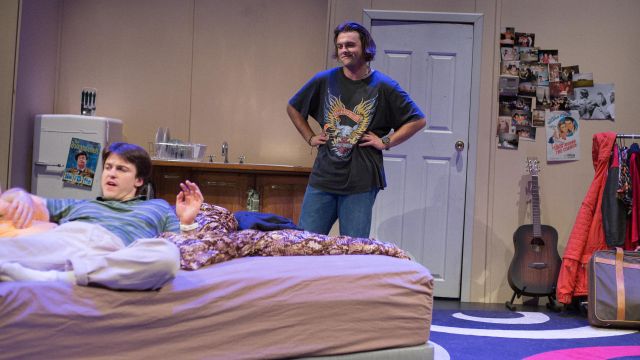This is our Youth
It’s difficult to be a young person in America living under a Republican President. The usual repositories of trust - parents, authorities and institutions - are corrupt. There is no hope for the future beyond mindless hedonism and no choice other than to live at home. Such is the situation for Warren, Dennis and Jessica – privileged, upper West Side Jewish kids in the 1980s. It is odd to contemplate that the trio of Warren, Dennis and Jessica may well be the parents of today’s current crop of Twenty-somethings.
Jacob Golding and Sam Tooker, two entrepreneurial young men who had great success with True West in 2022, have chosen another great script as the vehicle for their talents. This time with actor, Ella Watkins, there are three great characters to explore. While none of the characters are particularly likeable, and Dennis (Tooker) is quite abhorrent, the characters are all recognisable. They are young people terrified of adult life, paralysed in a liminal space where dependence on the dysfunctional previous generation has stunted growth. Most of the sympathy is for Warren, the hapless fool who idolises and is diminished by Dennis. Dennis is manipulative, destructive and delusional and only becomes sympathetic as a result of his complete lack of self-awareness. When he waxes lyrical as to all the things he could be and do (and never will), he is both pathetic and deeply funny. Jessica (Emma Watkins) as Warren’s love interest, is conflicted and selfish but also immature and naïve. By the end of the play, Warren has been hurt and let down by everyone and his chance for freedom and growth is lost.

There is not a lot of plot or action in Lonergan’s play but the dialogue is delightful, well-paced and funny. Tooker and Golding give excellent physical representations of their characters, a commitment which extends to truly awful haircuts. The actors fully embody both the lassitude, nervous energy and narcissism of Dennis (Tooker) and the loose, boyish, fidgetiness of Warren (Golding) with is goofy charming grin. This is in part due to the long rehearsal process with director Penny MacDonald. If Watkins appears less comfortable in her own skin it is because so is Jessica. A student of fashion, Jessica dresses to be seen but does not know who she is or what she wants. It is Jessica who argues the possibility of transformation into maturity but ultimately declines to do so, denying Warren’s growth in the process.
Warren (Golding) obsessively moons over his collection of mint condition objects of pop culture. This is a little overplayed but serves to reinforce Warren’s vulnerability and the theme of the young person caught between childhood and adulthood. The market value of toys and drugs become equated with the worth of people and relationships. At the end of the play, Dennis (Tooker) retains an inflated sense of his worth whilst Warren (Golding) is entirely diminished and left with nothing.

The Studio Theatre at the Theatre Royal was the right venue for this production which is intimate and almost voyeuristic. The audience could almost smell Dennis’ unwashed bedsheets. Nathan Golding (set supervisor) and Ursula Holliday (creative director) create a convincing 80s bachelor pad. This is augmented by a soundscape (uncredited) that reminds the audience of the city outside, with all its hustle, and desperation. This is complemented by era appropriate costumes.
Whilst This is Our Youth might be just about lost rich kids in 1980s America, there are ideas within the pay that are as relevant as when it was first produced. If nothing else, Tooker and Golding make the two-hour investment of time entirely worthwhile.
Anne Blythe-Cooper
Subscribe to our E-Newsletter, buy our latest print edition or find a Performing Arts book at Book Nook.

